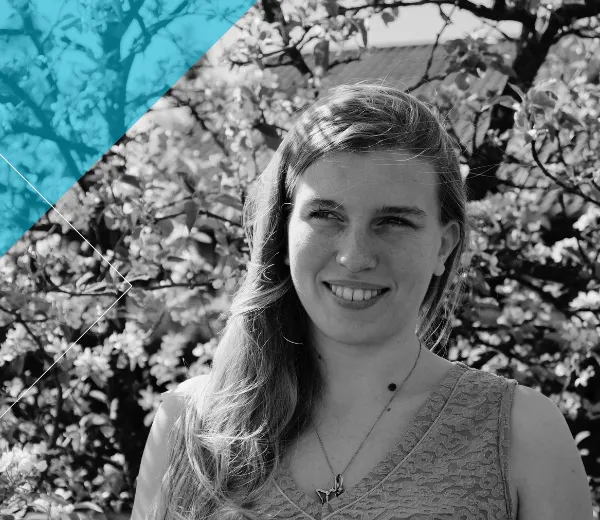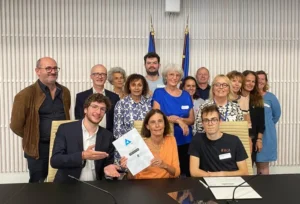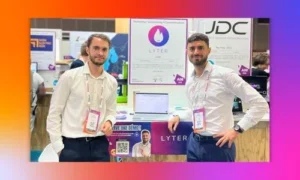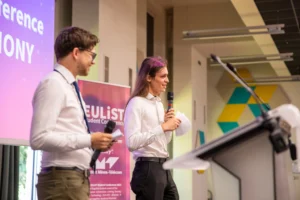Clarissa Gregory is a second-year PhD student at IMT Mines Alès, and is almost halfway through her thesis. After being awarded her engineering degree from the school’s Prism department, she embarked on her doctoral studies.
As part of her thesis, on the topic of the development of methodological contributions for digital twins in Industry 4.0, Clarissa has just returned from a three-month EULiST placement at the Slovak University of Technology in Bratislava (Stuba), Slovakia.
This experience gave her the opportunity to conduct a proof of concept of her tools, access new scientific resources and take a step back from her research. She is a keen traveler, and also enjoyed discovering Slovakian culture. Here’s a look back at her experience.
Can you tell us a little about yourself and your studies ?
I am in the second year of my PhD at IMT Mines Alès. Before that, I studied engineering and more specifically system engineering, at IMT Mines Alès, at the Prism department. I was lucky enough to take part in the dual degree program with Japan thanks to funding from the Fondation Mines-Télécom, and I am extremely grateful for that opportunity.
This dual degree was very much centered around research, but specialized in the processing of biological signals for health. At this point in my life, I still wasn’t sure about focusing my career on research. As it happens, this was an opportunity to get some full time experience working in a laboratory for a year and a half. It was less demanding than working on a thesis, and at the same time, a great experience in research.
To conclude, I understood that I wanted to go into research, but in another field, one that was closer to what I had done previously.
Can you describe your thesis in a few words ?
The aim of my thesis is to put forward methodological contributions for digital twins, which are accurate representations of complex systems. This can be any sort of system, such as factory, transport systems, vehicles (planes, boats, etc.).
Designing a system involves a lot of data and models which are grouped together in the form of digital models. In the context of Industry 4.0 – the alliance of traditional manufacturing operations and production-enhancing technologies, or digital for industry – digital twin technology is paramount.
The aim of my thesis is to exploit digital models and retrospective data for the development of digital twins.
Why did you choose to go to Bratislava for your EULiST placement ?
From a very practical point of view, I made use of the network of my thesis supervisors, who had already had the opportunity to work with STUBA. From a scientific point of view, my thesis falls within a very theoretical framework. This exchange provided me with a use case for the tools I’m developing, and enabled me to conduct an initial proof of concept, on a pilot production machine.
After working on my thesis for a year in Alès, it also gave me an opportunity to get out of the laboratory, and take a step back from the theoretical data I had collected. Like a sort of retreat to refocus.
I also had access to other article databases that I could add to my bibliography with new research that I would have had difficulty finding if I had stayed in France.
Finally, I love traveling so I am also keen to discover another culture, both professional and in everyday life, and new culinary experiences. On that note, I highly recommend Slovak soup, it’s delicious!
What did you need you do to prepare for your trip ?
The application formalities requested by IMT are fairly minimal. Above all, you have to make a good case for your research proposal, but that’s a typical request in research, so it’s entirely feasible. I was lucky enough to have excellent support from my supervisors in Alès (Vincent Chapurlat and Souad Rabah-Chaniour), in organizing my research project and making contact with the laboratory over there.
After that, everything went very quickly. I received a positive response from IMT just a fortnight after the application deadline. I was allocated student accommodation by the host university for just long enough to find my feet.
While I was there, I was given fairly good support when I had questions about the machine in particular, and I kept in touch with my supervisors in Alès.
Any advice for PhD students who are hesitating about doing an EULiST placement ?
- Take the time to work on your budget to make sure it is in line with the financial support available to you.
- Make sure your research project is well prepared. The placement obviously needs to be useful from a scientific point of view. One of the conditions is in fact to publish a scientific article on the results of our research, once we have returned to France.
- I also recommend choosing the right time to leave. In my opinion, the beginning of the second year of your thesis is the right time. In the first year, we don’t know the topic well enough, and later than that, it’s too difficult to fit in around writing your thesis.
- Also, get the help you need in the host country by getting in contact with the laboratory and the university beforehand.
All that’s left to say is just go for it, because it’s a fantastic experience. It allows you to combine business with pleasure, and to do some networking in another country, which is essential in the world of research. I am delighted to have had this opportunity, and I am very grateful to IMT for offering this sort of scheme.
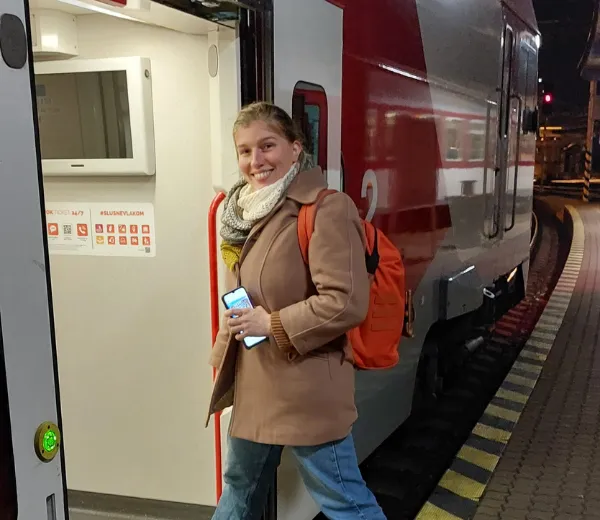
Interview conducted by Marie Scharff.

